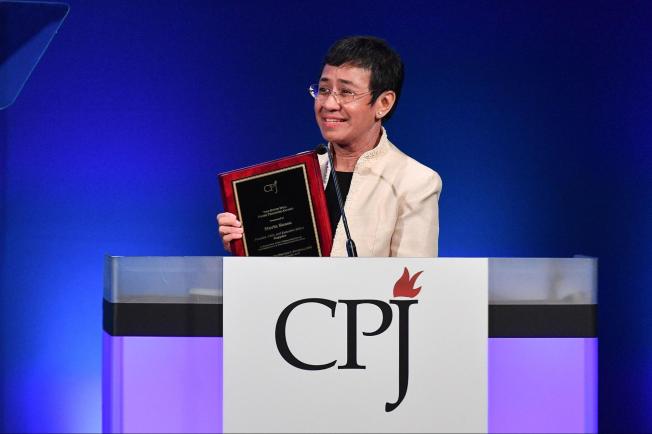World Refugee Day: CPJ’s Lucy Westcott on journalists in exile
For World Refugee Day on Thursday, June 20, CPJ highlighted the plight of journalists forced to flee their home countries due to threats, violence, and repression. As a growing number of journalists are being exiled, many face ongoing dangers even after they have reached safety.
CPJ has documented cases of exiled journalists targeted by their home governments after settling in a new country, otherwise known as transnational repression. Such tactics include surveillance, legal threats, and even violence.
Journalists have also been targeted by non-state actors in their homes, as well. One example is Ecuadorian morning show host Juan Carlos Tito, who regularly updated listeners on weather, power outages, and more as the trusted voice of Radio Selva in the Andean highlands. After investigating drug gangs in his community, death threats forced him and his wife, show producer Elvira del Pilar Nole, to flee, leaving the future of their show in jeopardy.
Huge numbers of journalists have fled Afghanistan in the three years since the Taliban retook control of the country in 2021 and began attacking and imprisoning members of the press. Since the Taliban takeover, CPJ has assisted more than 100 Afghan journalists with exile and relocation support, 47 in 2023 alone.
Iran has also cracked down on journalists in exile since 2022 following the death of a young woman, Mahsa Amini, in morality police custody. Over the past four years, CPJ has provided exile and relocation support to 19 Iranian journalists who moved to Turkey, Pakistan, Georgia, and several European countries.
Our work supporting these journalists demands the creation of safer pathways for journalists to flee danger, the issuance of more emergency visas, and a stronger commitment from host countries to protecting exiled journalists. To read more about these journalists and the struggles they face, read Lucy’s feature here.
Leading press freedom organizations submit amicus brief in Maria Ressa case

In an effort to deter the legal persecution of trailblazing journalist and Nobel Laureate Maria Ressa and her former colleague Reynaldo Santos, and to protect the public’s right to be informed, CPJ and its partners submitted an amicus curiae brief to the Supreme Court of the Philippines this month. The brief argued that the criminal convictions of Ressa and Santos for “cyber libel” not only breach the international obligations of the Philippines but betray a press freedom legacy the court has reaffirmed for more than a century.
This brief, if admitted by the Court, would be the third amicus curiae intervention accepted in this case, following filings by the U.N. Special Rapporteur on freedom of opinion and expression and the International Bar Association’s Human Rights Institute in Ressa’s final appeal of her libel conviction before the Supreme Court of the Philippines.
“Twelve years since the publication of an article that has been woven into a vicious campaign against Maria Ressa, Rappler and other members of the press, it is clearer than ever that this spurious case intended to silence independent, critical reporting simply does not stand,” CPJ and its partners said. “We urge the court to overturn the unjust convictions against Ressa and Santos. This weaponization of the law must come to an end.”
Read the brief in full here.
Must-read
In a feature for CPJ, Palestinian journalist Abu Bakr Bashir writes about the struggles he faced as a journalist in Gaza, balancing complex relationships with Israel and Hamas in order to do his job, as well as the friends he lost along the way. “When I lived in Gaza, I was worried about my life and my children’s future. Now in London, I worry about Gaza and the future of journalism there,” he writes for CPJ, “And at the end of this, will there be young men and women willing to go into journalism in Gaza?”
CPJ’s John Otis spoke with journalists who fled Ecuador following drug-related violence and threats they faced for investigating local gangs. One media group in Ecuador, Fundamedios, found that at least 16 journalists have fled the country since 2023. “He lifted up his shirt and showed me his gun,” one journalist said of a threat he received. “He called me a ‘toad’ [a police informer] and said: ‘If you keep publishing this stuff, you will see what will happen.’”
CPJ Africa program staff took a close look at journalists from Ethiopia who fled amid a prolonged media crackdown. CPJ is aware of at least 54 Ethiopian journalists and media workers who have gone into exile since 2020, and has provided at least 30 of them with emergency assistance. “My only two options,” one journalist told CPJ, “were living in my beloved country without working my beloved job; or leaving my beloved country and working my beloved job.”
CPJ in the news
“Being a journalist in Mexico can be a life-or-death experience,” The New York Times
“Palestinian journalist attacked by Israeli mob during Jerusalem rally,” Arab News
“100 organizations, legal experts urge Senate panel to advance press protection bill,” The Hill
“Press activists, US condemn assault on reporters at Jerusalem Day march,” Reuters
“With watershed election, Claudia Sheinbaum must address Mexico’s human rights crisis,” Just Security
“Vietnam national security police confirm arrest of prominent writer Truong Huy San for Facebook post,” The Associated Press
“Journalists covering 2024 election face hostilities and fear police action,” Truthout
“Why a Nigerian woman faces jail time for reviewing tomato puree,” Al Jazeera
“Global media groups urge SC to overturn Maria Ressa’s cyber libel conviction,” Rappler
“WikiLeaks founder Julian Assange strikes plea deal with the US,” NPR
This content originally appeared on Committee to Protect Journalists and was authored by Committee to Protect Journalists.
This post was originally published on Radio Free.